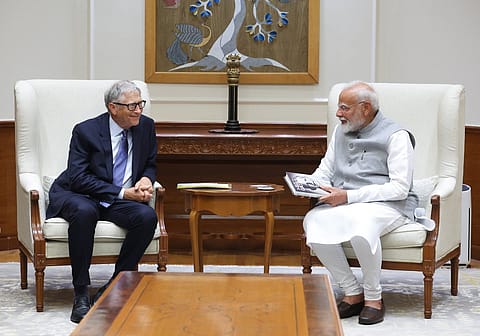Bill Gates and India’s healthcare push: Philanthropy, policy, and the power shift at WHO
Bill Gates' India visit highlights the Bill & Melinda Gates Foundation’s growing role in healthcare, its impact on WHO funding, and India's push for accessible, quality healthcare for all.

Last week, Bill Gates, founder of the Bill & Melinda Gates Foundation (BMGF), met with top Indian political leaders, including Prime Minister Narendra Modi and Union Health Minister J. P. Nadda, who is also the national president of the ruling Bharatiya Janata Party (BJP), during his visit to India.
In a post on the social media platform X, Gates later said that his discussion with Modi centred on “India’s development, the path to Viksit Bharat @ 2047, and exciting advancements in health, agriculture, AI, and other sectors that are creating impact today.” Nadda posted on X that his discussion with Gates covered India’s progress in healthcare, particularly in maternal health, immunisation, and sanitation, through its collaboration with the BMGF. “I acknowledged the Foundation’s valuable support in strengthening health systems and driving impactful initiatives. We look forward to renewing our Memorandum of Cooperation (MoC), furthering our shared commitment to ensuring affordable, accessible, and quality healthcare for all citizens,” Nadda wrote.
Bill Gates’ visit to India could not have come at a more opportune time, as the role of his Foundation in transforming the health and lives of millions in developing countries is becoming increasingly significant.
The Gates Foundation's crucial role in Indian health initiatives is well known. Since 2003, the Foundation has been active in India, supporting the government in HIV prevention efforts, the polio eradication mission, and various projects aimed at improving reproductive, maternal, newborn, and child health and nutrition, as well as sanitation, among vulnerable communities. Beyond health and sanitation, the BMGF also works towards promoting sustainable agriculture, gender equality, and inclusive financial systems in India. According to the Foundation’s website, as of March 17, 2025, it has committed grants for over 900 programmes in India.
According to the BMGF, the MoC with India's Ministry of Health and Family Welfare allows it to provide technical, management, and programme design support for key health initiatives. “Under the MoC, the Foundation supports the ministry’s work to improve health outcomes, such as by reducing maternal and child mortality, improving nutrition services, and increasing immunisation coverage. Collaborative efforts are being made to increase access to family planning measures among younger women and reduce the burden of specific infectious diseases, such as tuberculosis, visceral leishmaniasis, and lymphatic filariasis. The Foundation also supports the government’s efforts to strengthen supply chains and improve the management of human resources in healthcare,” the BMGF states on its website.
The importance of the BMGF as a funding institution for global health grew significantly after U.S. President Donald Trump announced in January 2025 that his government was withdrawing from the World Health Organization (WHO). The U.S., contributing 13.86% of the WHO’s annual budget, was its largest donor. With the U.S. exiting, that distinction now rests with the WHO’s second-largest donor, the BMGF. Bill Gates’ philanthropy has committed a contribution equivalent to 12.74% of WHO’s 2024–25 annual budget. In contrast, India contributes only 1.26% and China 0.32% of WHO’s budget. This highlights the BMGF’s increasing importance and potential influence in driving WHO’s universal health agenda.
The BMGF’s contributions to the WHO are also of interest to India, as one of the key outcomes of its funding has been showcased as “polio eradication and transition plans implemented in partnership with the Global Polio Eradication Initiative.” The Foundation’s WHO contributions support programmes aimed at improving access to quality essential health services, strengthening data and innovation capabilities, and ensuring better access to essential medicines, vaccines, diagnostics, and medical devices for primary healthcare.
Recommended Stories
As one of the world's leading suppliers of generic medicines and vaccines, Indian pharmaceutical and vaccine companies that supply products for WHO immunisation programmes or drugs for diseases like tuberculosis also benefit indirectly from WHO initiatives supported by BMGF funding. The philanthropy’s growing role in global healthcare is thus of interest to such companies as well.
As Health Minister Nadda noted, India’s intention to renew its collaboration agreement with the BMGF is a welcome step. However, government funding and the role of public institutions in ensuring affordable, accessible, and quality healthcare for all remain responsibilities that no country can overlook. Even at the global WHO level, the funding gap created by the U.S. withdrawal can only be bridged through the collective efforts of remaining member nations. While private philanthropy can contribute significantly to this cause, governments must take the lead. India is no exception.